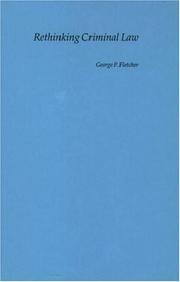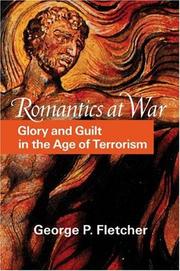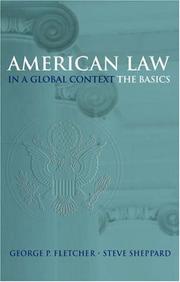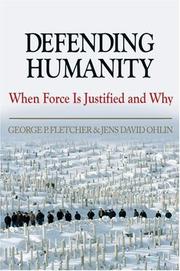| Listing 1 - 6 of 6 |
Sort by
|

ISBN: 0199872163 9786610655342 0195302656 1280655348 0198032439 1602566976 9780199872169 9780198032434 9780195302653 9780195156287 0195156285 9780195141429 0195141423 6610655340 9781280655340 9781602566972 0190286474 Year: 2001 Publisher: Oxford New York Oxford University Press
Abstract | Keywords | Export | Availability | Bookmark
 Loading...
Loading...Choose an application
- Reference Manager
- EndNote
- RefWorks (Direct export to RefWorks)
Americans hate and distrust their government, but, at the same time, love and trust their government. These contradictory attitudes are resolved by Fletcher's novel interpretation of constitutional history. He says that the US has 2 constitutions - one catering to freedom and fear, the other to the need for security and social justice.
Constitutional history --- Constitutional amendments --- Lincoln, Abraham, --- Political and social views. --- United States. --- United States --- Politics and government --- Linkŭln, Abrakham, --- Linkolʹn, Avraam, --- Linkūln, Ibrāhīm, --- Linkan, ʼAbrehām, --- Lincoln, A. --- Lin-kʻen, --- Linken, --- Lin, Kʻen, --- Lingkʻŏn, --- Lincoln, Abe, --- Liṅkan, Ēbrāhaṃ, --- Liṅkan, Abrahāṃ, --- לינקאלין, --- לינקאלן, אייברעהעם, --- לינקולן, אברהם --- 林肯, --- Liṅkana, Ābrāhama,

ISBN: 128083448X 0195350367 9780195350364 0195136950 9780195136951 0199881308 0197720420 9780199881307 9780197720424 Year: 2000 Publisher: Oxford New York Oxford University Press
Abstract | Keywords | Export | Availability | Bookmark
 Loading...
Loading...Choose an application
- Reference Manager
- EndNote
- RefWorks (Direct export to RefWorks)
This is a reprint of a book first published by Little, Brown in 1978. George Fletcher is working on a new edition which will be published by OUP in three volumes, the first of which is scheduled to appear in January 2001. Rethinking Criminal Law is still perhaps the most influential and often cited theoretical work on American criminal law. This reprint will keep this classic work available until the new edition can be published.
Criminal law. --- Criminal liability. --- Accountability, Criminal --- Criminal accountability --- Criminal liability --- Criminal responsibility --- Liability, Criminal --- Responsibility, Criminal --- Liability (Law) --- Crime --- Crimes and misdemeanors --- Criminals --- Law, Criminal --- Penal codes --- Penal law --- Pleas of the crown --- Public law --- Criminal justice, Administration of --- Criminal procedure --- Law and legislation --- Legal status, laws, etc.

ISBN: 1282087614 9786612087615 1400825172 9781400825172 9780691006512 0691006512 9781282087613 Year: 2002 Publisher: Princeton Princeton University Press
Abstract | Keywords | Export | Availability | Bookmark
 Loading...
Loading...Choose an application
- Reference Manager
- EndNote
- RefWorks (Direct export to RefWorks)
America is at war with terrorism. Terrorists must be brought to justice. We hear these phrases together so often that we rarely pause to reflect on the dramatic differences between the demands of war and the demands of justice, differences so deep that the pursuit of one often comes at the expense of the other. In this book, one of the country's most important legal thinkers brings much-needed clarity to the still unfolding debates about how to pursue war and justice in the age of terrorism. George Fletcher also draws on his rare ability to combine insights from history, philosophy, literature, and law to place these debates in a rich cultural context. He seeks to explain why Americans--for so many years cynical about war--have recently found war so appealing. He finds the answer in a revival of Romanticism, a growing desire in the post-Vietnam era to identify with grand causes and to put nations at the center of ideas about glory and guilt. Fletcher opens with unsettling questions about the nature of terrorism, war, and justice, showing how dangerously slippery the concepts can be. He argues that those sympathetic to war are heirs to the ideals of Byron, Fichte, and other Romantics in their belief that nations--not just individuals--must uphold honor and be held accountable for crimes. Fletcher writes that ideas about collective glory and guilt are far more plausible and widespread than liberal individualists typically recognize. But as he traces the implications of the Romantic mindset for debates about war crimes, treason, military tribunals, and genocide, he also shows that losing oneself in a grand cause can all too easily lead to moral catastrophe. A work of extraordinary intellectual power and relevance, the book will change how we think not only about world events, but about the conflicting individualist and collective impulses that tear at all of us.
Terrorism --- Guilt (Law) --- Romanticism --- War --- War (International law) --- Hostilities --- International law --- Neutrality --- Armed conflict (War) --- Conflict, Armed (War) --- Fighting --- Wars --- International relations --- Military art and science --- Peace --- Pseudo-romanticism --- Romanticism in literature --- Aesthetics --- Fiction --- Literary movements --- Criminal law --- Criminal liability --- Philosophy. --- Political aspects. --- Moral and ethical aspects --- War and society --- Romanticism. --- Just war doctrine. --- Justice. --- Terrorism. --- Guilt. --- Moral and ethical aspects. --- Guilt --- Emotions --- Ethics --- Conscience --- Shame --- Acts of terrorism --- Attacks, Terrorist --- Global terrorism --- International terrorism --- Political terrorism --- Terror attacks --- Terrorist acts --- Terrorist attacks --- World terrorism --- Direct action --- Insurgency --- Political crimes and offenses --- Subversive activities --- Political violence --- Terror --- Injustice --- Conduct of life --- Law --- Common good --- Fairness --- Jus ad bellum --- War (Philosophy) --- War and morals --- Psychological aspects --- Religious aspects

ISBN: 1280534095 0199729298 1433700409 9780199729296 1423720806 9781423720805 9780195167238 0195167236 9780195167221 0195167228 9781280534096 9781433700408 0197718280 9780197718285 Year: 2005 Publisher: Oxford New York Oxford University Press
Abstract | Keywords | Export | Availability | Bookmark
 Loading...
Loading...Choose an application
- Reference Manager
- EndNote
- RefWorks (Direct export to RefWorks)
An introduction to the American legal system from a global perspective. Using a comparative approach, the authors introduce underlying principles of common and civil law, constitutional, criminal, and public law, and property and procedure.
Law --- Lawyers, Foreign --- Foreign lawyers --- Foreign-trained lawyers --- Acts, Legislative --- Enactments, Legislative --- Laws (Statutes) --- Legislative acts --- Legislative enactments --- Jurisprudence --- Legislation --- Anglo-American law --- Law, Anglo-American --- Handbooks, manuals, etc --- United States --- Lawyers [Foreign ] --- Handbooks, manuals, etc.

ISBN: 1281162582 9786611162580 0198040350 9780198040354 9780195183085 0195183088 9781281162588 6611162585 Year: 2008 Publisher: Oxford New York Oxford University Press
Abstract | Keywords | Export | Availability | Bookmark
 Loading...
Loading...Choose an application
- Reference Manager
- EndNote
- RefWorks (Direct export to RefWorks)
In Defending Humanity, internationally acclaimed legal scholar George P. Fletcher and Jens David Ohlin, a leading expert on international criminal law, tackle one of the most important and controversial questions of our time: When is war justified? When a nation is attacked, few would deny that it has the right to respond with force. But what about preemptive and preventive wars, or crossing another state's border to stop genocide? Was Israel justified in initiating the Six Day War, and was NATO's intervention in Kosovo legal? What about the U.S. invasion of Iraq?. In their provocative new boo
War. --- War --- Intervention (International law) --- Preemptive attack (Military science) --- Security, International. --- Collective security --- International security --- International relations --- Disarmament --- International organization --- Peace --- Anticipatory self-defense (Military science) --- Preemption (Military science) --- Preemptive strikes (Military science) --- Preemptive warfare --- Military art and science --- Strategy --- Military intervention --- Diplomacy --- International law --- Neutrality --- Causes of war --- Armed conflict (War) --- Conflict, Armed (War) --- Fighting --- Hostilities --- Wars --- Causes. --- Intervention (International law). --- Preemptive attack (Military science).
Book

ISBN: 1282753053 9786612753053 1400822017 9781400822010 9781282753051 Year: 1998 Publisher: Princeton, NJ
Abstract | Keywords | Export | Availability | Bookmark
 Loading...
Loading...Choose an application
- Reference Manager
- EndNote
- RefWorks (Direct export to RefWorks)
If we are to understand the concept of toleration in terms of everyday life, we must address a key philosophical and political tension: the call for restraint when encountering apparently wrong beliefs and actions versus the good reasons for interfering with the lives of the subjects of these beliefs and actions. This collection contains original contributions to the ongoing debate on the nature of toleration, including its definition, historical development, justification, and limits. In exploring the issues surrounding toleration, the essays address a variety of provocative questions. Is toleration a moral virtue of individuals or rather a pragmatic political compromise? Is it an intrinsically good principle or only a "second best-solution" to the dangers of fanaticism to be superseded one day by the full acceptance of others? Does the value of toleration lie in respect to individuals and their autonomy, or rather in the recognition of the right of minority groups to maintain their communal identity? Throughout, the contributors point to the inherent indeterminacy of the concept and to the difficulty in locating it between intolerant absolutism and skeptical pluralism. Religion, sex, speech, and education are major areas requiring toleration in liberal societies. By applying theoretical analysis, these essays show the differences in the argument for toleration and its scope in each of these realms. The contributors include Joshua Cohen, George Fletcher, Gordon Graham, Alon Harel, Moshe Halbertal, Barbara Herman, John Horton, Will Kymlicka, Avishai Margalit, David Richards, Thomas Scanlon, and Bernard Williams.
Philosophy. --- Toleration -- Study and teaching. --- Toleration.
| Listing 1 - 6 of 6 |
Sort by
|

 Search
Search Feedback
Feedback About UniCat
About UniCat  Help
Help News
News